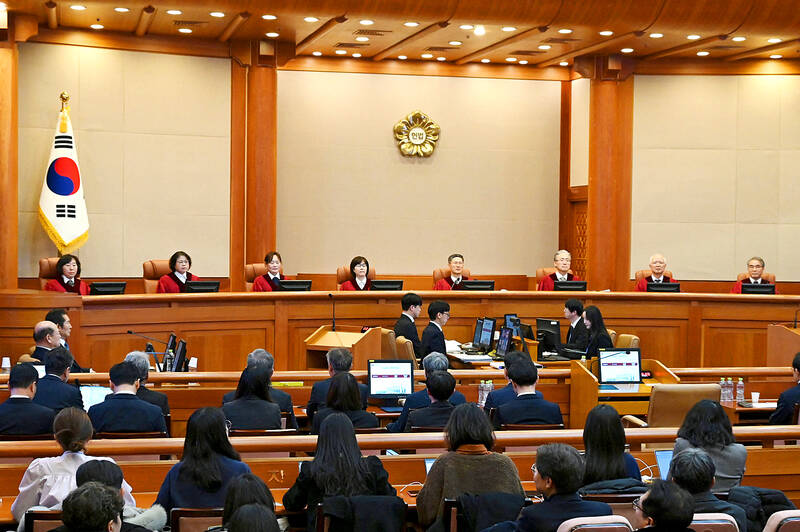Ousted South Korean President Yoon Suk-yeol’s bid to impose martial law was aimed at thwarting a “legislative dictatorship” by the opposition-controlled parliament, his lawyer said yesterday as Yoon became the country’s first president to stand trial in a criminal case while in office.
Yoon has been behind bars since he was arrested last month on charges of insurrection.
Criminal proceedings at Seoul’s Central District Court yesterday morning lasted just over an hour. Yoon attended the hearing, but did not speak.

Photo: AFP
Prosecutors have accused the suspended president of being the “ringleader of an insurrection.”
They argued against releasing him from the detention facility, saying Yoon could try to “influence or persuade those involved in the case.”
Addressing the court, Yoon’s lawyer Kim Hong-il in turn condemned the “illegal probe,” arguing that the “investigating body has no jurisdiction.”
“The declaration of martial law was not intended to paralyze the state,” Kim said.
Instead, it was meant to “alert the public to the national crisis caused by the legislative dictatorship of the dominant opposition party, which had crippled the administration,” he said.
“The judiciary must serve as the stabilizing force,” he told the court’s three judges, warning that he was “witnessing a reality where illegality compounds illegality.”
Separately, South Korea’s Constitutional Court is deliberating whether to formally remove Yoon from office following his impeachment by parliament in December last year.
Called to testify at that hearing was Han Duck-soo, who was also impeached as acting president following Yoon’s removal from office.
Han told the court that he had opposed Yoon’s declaration of martial law.
Han said that he and most of his fellow Cabinet members “believed it would put South Korea in serious difficulty,” and that he recalled them “being concerned and trying to dissuade it.”

Right-wing political scientist Laura Fernandez on Sunday won Costa Rica’s presidential election by a landslide, after promising to crack down on rising violence linked to the cocaine trade. Fernandez’s nearest rival, economist Alvaro Ramos, conceded defeat as results showed the ruling party far exceeding the threshold of 40 percent needed to avoid a runoff. With 94 percent of polling stations counted, the political heir of outgoing Costa Rican President Rodrigo Chaves had captured 48.3 percent of the vote compared with Ramos’ 33.4 percent, the Supreme Electoral Tribunal said. As soon as the first results were announced, members of Fernandez’s Sovereign People’s Party

MORE RESPONSIBILITY: Draftees would be expected to fight alongside professional soldiers, likely requiring the transformation of some training brigades into combat units The armed forces are to start incorporating new conscripts into combined arms brigades this year to enhance combat readiness, the Executive Yuan’s latest policy report said. The new policy would affect Taiwanese men entering the military for their compulsory service, which was extended to one year under reforms by then-president Tsai Ing-wen (蔡英文) in 2022. The conscripts would be trained to operate machine guns, uncrewed aerial vehicles, anti-tank guided missile launchers and Stinger air defense systems, the report said, adding that the basic training would be lengthened to eight weeks. After basic training, conscripts would be sorted into infantry battalions that would take

GROWING AMBITIONS: The scale and tempo of the operations show that the Strait has become the core theater for China to expand its security interests, the report said Chinese military aircraft incursions around Taiwan have surged nearly 15-fold over the past five years, according to a report released yesterday by the Democratic Progressive Party’s (DPP) Department of China Affairs. Sorties in the Taiwan Strait were previously irregular, totaling 380 in 2020, but have since evolved into routine operations, the report showed. “This demonstrates that the Taiwan Strait has become both the starting point and testing ground for Beijing’s expansionist ambitions,” it said. Driven by military expansionism, China is systematically pursuing actions aimed at altering the regional “status quo,” the department said, adding that Taiwan represents the most critical link in China’s

EMERGING FIELDS: The Chinese president said that the two countries would explore cooperation in green technology, the digital economy and artificial intelligence Chinese President Xi Jinping (習近平) yesterday called for an “equal and orderly multipolar world” in the face of “unilateral bullying,” in an apparent jab at the US. Xi was speaking during talks in Beijing with Uruguayan President Yamandu Orsi, the first South American leader to visit China since US special forces captured then-Venezuelan president Nicolas Maduro last month — an operation that Beijing condemned as a violation of sovereignty. Orsi follows a slew of leaders to have visited China seeking to boost ties with the world’s second-largest economy to hedge against US President Donald Trump’s increasingly unpredictable administration. “The international situation is fraught